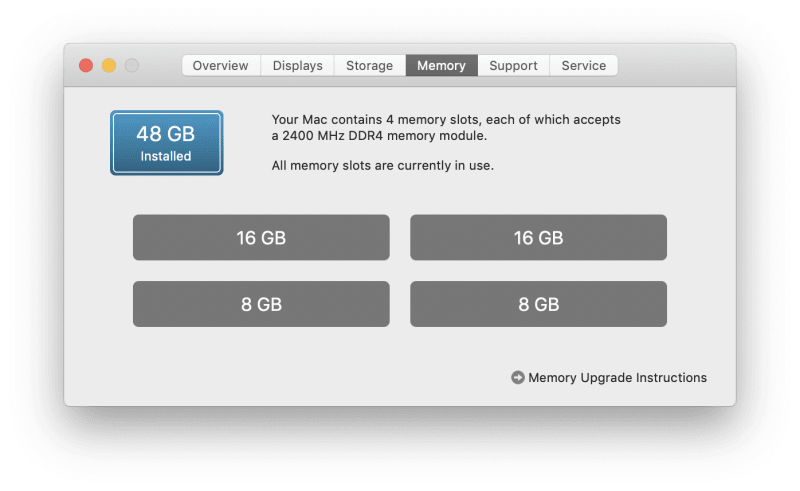Much has been written about how Electron apps take a lot of memory; after all, each one is running its own instance of a web browser, and pulling in all of the overwhelming amounts of support code that implies. Slack can easily end up taking over 1GB of RAM, and Discord usually takes a few hundred as well. As someone who used to use IRC back in the 90s, when a single task taking even 1 MB of RAM was considered a lot, this feels rather horrifying:
On my iMac, with 24GB of RAM, that means that chat apps — doing the equivalent of an IRC client (granted, with a bit more visual stuff, but not that much) — were taking about 6% of my RAM!
But come to think of it, back in the mid 90s, when a typical computer had 8MB, an IRC client probably took around 400KB of RAM, which is also 6%. So have things really grown proportionally in that way?
Well, I've figured out a way of getting these chat apps to take half as much of my total RAM overall, but first, let's talk about my personal history of memory usage.
In 1983, my family got our first computer. It was a Commodore 64, an 8-bit microcomputer with 64KB of RAM (with no separate video memory) and while we started out with the Datasette tape drive, we soon upgraded to the 1541 disk drive, which let us store a whole whopping 170KB per side (340KB per disk) — albeit with the use of a hole punch.
I mostly used this machine for making art and music, and playing games.
A few years later we upgraded to a Commodore 128, although we kept using the 1541 disk drive. This had 128KB of memory, although I mostly just ran C64 apps on it (although as the family word processor, the C128-enhanced version of Pocket Writer was a huge upgrade for us).
In the late 80s we got a PC AT clone. 80286 at 12MHz (I think), with a whopping megabyte of RAM. This was the machine where I first got online, as well; we had a modem for the C64 but it was only 300 baud, and the 2400 baud modem on the 286 was actually useful. All online access was through a dialup account, and I doubt the modem program used more than 64KB of RAM (because DOS). So the ability to chat used (effectively) around 6%, sort of. We also had a 40MB hard drive for it.
I mostly used this machine for making art, playing games, and chatting online. (I still used the C64 for making music. Not the C128 — its SID chip sadly met a tragic end due to an incident with static electricity.)
In the early 90s we got a 486, with 4 MB of RAM. It mostly ran Windows, and we got online via AOL. I don't know how much RAM the client used, but it seems credible that it would have used around 250KB, which would have been 6%. We eventually upgraded to 8MB (that extra 4 MB of SIMMs cost something like $180 in 1994 dollars!). I believe we started out with a 100MB hard drive and eventually upgraded to a whopping 200MB.
I mostly used this machine for making art, playing games, making music (Pro Audio Spectrum 16, heck yes), and chatting online.
When I went off to college in 1995 I built myself a 486/100. I went all out, equipping it with 16MB of RAM, and had it dual-boot Windows and Linux. I think the hard drive was 1.2GB! It was so amazing.
I mostly used this machine for making art, playing games, chatting online (using mIRC, which I wouldn't be at all surprised if that used around 1MB of RAM — i.e. 6%), and making music.
Okay, so, life moves forward. More and more computers happen, storage gets bigger, RAM gets bigger.
Come forward to 2017 and I buy my current machine, an iMac, with 2TB of built-in storage, with a 1TB external drive for my media and a... rather large NAS. I'm swimming in storage capacity, and it still doesn't feel like enough space.
And I mostly use this machine for... making art and music, playing games, and chatting online.
And the chat clients still take 6% of my memory.
But wait! In the introduction, I said I had a means of making the chat clients only take 3% of my memory. And it was an easy fix!
Did I switch to one of the alternate clients like Sblack or Ripcord? Well, I've tried those out, but their UX doesn't quite work for my accessibility needs.
Did I switch to an IRC-based frontend? No, that removes too much of the functionality to be useful.
How about exotic things like forcing macOS to compress my RAM? Again, no!
The solution was much simpler than that...
Anyway, hopefully this will help me make art and music, play games, and chat online.





Top comments (0)